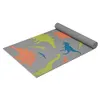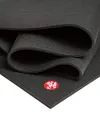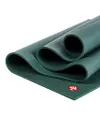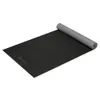You just need 20 minutes for a total core workout — I tried this session to blast my abs and obliques
Twist, plank and crunch for a stronger core

I find that variety is vital to keeping myself motivated during abs workouts, which is why I like to try new ones every week and also often do no-repeat sessions where you never do the same exercise twice.
There are pros and cons to the no-repeat approach, which I'll come onto later, but when you're targeting just a couple of areas of the body with your workout like the abs and obliques, you can usually strengthen the muscles effectively without having to do the same exercise twice, because lots of moves work the same muscles.
This 20-minute core workout from fitness trainer Maddie Lymburner, who goes by MadFit on YouTube, is a no-repeat, equipment-free session you can do anywhere. The only thing you might want to use is one of the best yoga mats, because with some of the plank variations in the workout I found my hands, elbows and feet would slip a little bit without the extra traction of a yoga mat beneath me.
Watch MadFit’s 20-minute standing abs workout
The workout involves doing 20 exercises in 20 minutes, doing each move for 45 seconds before resting for 15 seconds. During the breaks Lymburner demonstrates the next exercise you'll be doing so you can get into position and start straight away when your rest period is over.
It's a no-repeat workout so you never do the same move twice, but since most of the exercises are variations on planks and crunches, plus moves you do on your side to target the obliques, you are doing similar movements and it does maximize the time under tension for your core muscles.
Along with up and down movements like crunches to hit the upper and lower abs, there are twisting exercises to focus on the obliques, which are also targeted by plank hip dips.
I gave the workout a go to improve my total core strength, here are my takeaways.
It highlights your strengths and weaknesses
The variety of exercises you do during the workout really exposes what your strong and weak areas are. I was able to do all the plank variations in the workout comfortably, and was OK on the obliques exercises too, but the crunches and holds done while lying on my back were far harder for me.
As a result I might now swap some of the planks in my other workouts for exercises like the bicycle crunch and V-sit-ups to address the imbalance in my core strength.
Doing no-repeats has pros and cons
I like no-repeat workouts like this because the time seems to pass more quickly when you don’t have to push through a few sets of the same exercise. It’s also an advantage sometimes to not know what move is coming up — you’re not dreading it, for one — and switching exercises every minute allows you to target a wider range of muscles in 20 minutes than if you spent several minutes doing sets of one move.
However, changing up exercises every minute means that for some moves that I found easier, I didn’t really have time to exhaust the muscles before moving on. Doing several sets of the same exercise allows you to really target those muscles and improve your strength in that area.
That said, with moves I found harder, doing 45 seconds and then moving on was enough and having to do repeat sets would probably have resulted in me being unable to do the move for another 45 seconds. So there are certainly pros and cons to no-repeats — after doing this session I know which exercises I need to do several sets of, and which I could use in a no-repeat workout.
It’s suitable for all fitness levels
The variety of moves and style of the workout mean that anyone can give it a go, regardless of your existing fitness. If you find a move too hard to do for 45 seconds, you can take extra rests to get through the time, and know that you won't have to do it again because it is a no-repeat workout.
Meanwhile, if you are more experienced you can push harder during each 45 second work period to ensure you're challenging yourself, and you could even scrap the rests entirely, doing each move for a full minute and going straight into the next one without a break.
If you'd prefer a core session where you don't have to hit the floor, try this 20-minute standing abs workout instead.
Get your pace right to maximize the benefits
I went into each exercise with the aim of working quickly to maximize the amount of reps I did in 45 seconds, but actually for many of the moves in this workout the benefits are greater if you move slowly and with control.
In particular the side crunches I found hard to do quickly while maintaining good form, and actually moving more slowly kept the muscles under tension more effectively as it's easy to lose your balance slightly during the exercise if you're rushing.
With some of the exercises you can maintain good form at speed, like the plank walkout, but if you feel that you can't do so with any move you're definitely better off moving more slowly and keeping the core engaged properly throughout.
It introduced crunches I’ve never tried before
There are several crunch variations scattered throughout the workout and even as someone who has done a lot of abs workouts, a couple were new to me, like the star crunch where you spread your straight legs out to the sides and then bring them back in while crunching up.
It keeps the workout engaging to try new things, but make sure you pay attention to Lymburner during the rest periods to see what exercise is coming up. That way, if it is something you've not done before you can get to grips with the movement involved before your 45 seconds of work.
More from Tom's Guide
- I tried this 10-minute push-up challenge — here’s what happened
- Forget crunches — this 20-minute standing abs workout sculpts your core and boosts your metabolism
- I tried this 20-minute bodyweight abs workout with 14 million views — here’s what happened
Sign up to get the BEST of Tom's Guide direct to your inbox.
Get instant access to breaking news, the hottest reviews, great deals and helpful tips.

Nick Harris-Fry is an experienced health and fitness journalist, writing professionally since 2012. He spent nine years working on the Coach magazine and website before moving to the fitness team at Tom’s Guide in 2024. Nick is a keen runner and also the founder of YouTube channel The Run Testers, which specialises in reviewing running shoes, watches, headphones and other gear.
Nick ran his first marathon in 2016 after six weeks of training for a magazine feature and subsequently became obsessed with the sport. He now has PBs of 2hr 27min for the marathon and 15min 30sec for 5K, and has run 13 marathons in total, as well as a 50-mile ultramarathon. Nick is also a qualified Run Leader in the UK.
Nick is an established expert in the health and fitness area and along with writing for many publications, including Live Science, Expert Reviews, Wareable, Coach and Get Sweat Go, he has been quoted on The Guardian and The Independent.










